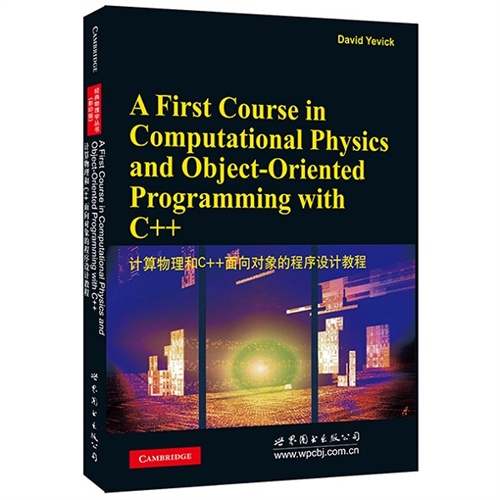
计算物理和C++面向对象的程序设计教程

- ISBN:9787510087738
- 装帧:一般胶版纸
- 册数:暂无
- 重量:暂无
- 开本:16开
- 页数:403
- 出版时间:2015-03-01
- 条形码:9787510087738 ; 978-7-5100-8773-8
本书特色
现代c++编程有关的科学编程的众多方面。由于这本教程的独特性,对于计算科学的学生和科学编程人员,其作用不可估量。尤其值得关注大篇幅的附录,这些附录都具有极强的应用性,不可忽视。 目次:(**部分)c++程序基础;安装和运行c++程序运行环境;计算机和软件结构;基本概念;**个程序;面向对象分析入门;c++面向对象程序句法;逻辑控制和迭代;基本函数性质;列和矩阵;输入和输出流;(第二部分)数值分析:数值错误分析;积分;求解程序;微分方程;线性代数;(第三部分)高等面向对象程序:参考资料;指针和动态存储分配;高等存贮处理;静态关键词、多继承和虚继承、模板和stl库;c++中的程序优化;(第四部分)科学编程案例:蒙特卡洛方法;抛物偏微分方程解;附录a:matlab概述;附录b:borlandc++编译器;附录c:linux/windows指令行c++编译器;附录d:从c++zhong提取fortran程序;附录e:c++编码标准。 读者对象:计算物理、计算科学以及相关领域的学生、老师和科研人员。
内容简介
现代C++编程有关的科学编程的众多方面。由于这本教程的独特性,对于计算科学的学生和科学编程人员,其作用不可估量。尤其值得关注大篇幅的附录,这些附录都具有极强的应用性,不可忽视。 目次:(**部分)C++程序基础;安装和运行C++程序运行环境;计算机和软件结构;基本概念;**个程序;面向对象分析入门;C++面向对象程序句法;逻辑控制和迭代;基本函数性质;列和矩阵;输入和输出流;(第二部分)数值分析:数值错误分析;积分;求解程序;微分方程;线性代数;(第三部分)高等面向对象程序:参考资料;指针和动态存储分配;高等存贮处理;静态关键词、多继承和虚继承、模板和STL库;C++中的程序优化;(第四部分)科学编程案例:蒙特卡洛方法;抛物偏微分方程解;附录A:Matlab概述;附录B:BorlandC++编译器;附录C:Linux/Windows指令行C++编译器;附录D:从C++zhong提取Fortran程序;附录E:C++编码标准。
目录
作者简介
David Yevick是国际知名学者,在数学和物理学界享有盛誉。本书凝聚了作者多年科研和教学成果,适用于科研工作者、高校教师和研究生。
-

乡村振兴新技术:新时代农村短视频编辑技术基础入门
¥12.8¥32.0 -

AI绘画+AI摄影+AI短视频从入门到精通
¥45.5¥79.8 -

企业AI之旅
¥43.5¥79.0 -

机器学习
¥59.4¥108.0 -

基于知识蒸馏的图像去雾技术
¥61.6¥88.0 -

软件设计的哲学(第2版)
¥51.0¥69.8 -

智能算法优化及其应用
¥52.4¥68.0 -

Photoshop图像处理
¥25.5¥49.0 -

R语言医学数据分析实践
¥72.3¥99.0 -

大模型推荐系统:算法原理、代码实战与案例分析
¥62.3¥89.0 -

剪映 从入门到精通
¥25.7¥59.8 -

游戏造梦师----游戏场景开发与设计
¥67.6¥98.0 -

SAR图像处理与检测
¥35.4¥49.8 -

人工智能
¥29.4¥42.0 -

中文版PHOTOSHOP 2024+AI修图入门教程
¥59.3¥79.0 -

WPS办公软件应用
¥25.2¥36.0 -

格拉斯曼流行学习及其在图像集分类中的应用
¥13.7¥28.0 -

轻松上手AIGC:如何更好地向CHATGPT提问
¥40.3¥62.0 -

元宇宙的理想与现实:数字科技大成的赋能与治理逻辑
¥61.6¥88.0 -

云原生安全:攻防与运营实战
¥66.8¥89.0











